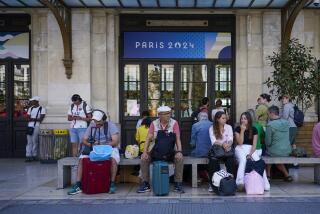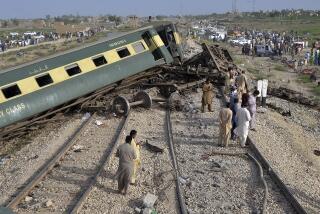Commuter Train Crash in London Kills at Least 26
- Share via
LONDON — At least 26 people died and about 150 were injured when two crowded commuter trains crashed and burst into flames near London’s Paddington Station at the height of rush hour Tuesday morning.
The collision was the worst in Britain in a decade and the second fatal crash on the same line in two years. It sent a plume of black smoke into a cloudless fall sky, and dozens of police cars, firetrucks and ambulances racing through traffic to the scene.
Before the rescuers arrived, passengers in shirt sleeves and neckties crawled out of the windows of overturned train cars and helped pull the walking wounded out after them. Employees from a nearby supermarket also tried to free passengers who were trapped inside burning rail cars and screaming for help.
It took emergency crews more than four hours to extract the last known survivors from the charred wreckage. One of the drivers apparently was among the dead.
Coats and briefcases littered the tracks around the mangled trains. Cut and bruised commuters wandered around the wreckage in a daze, as badly burned victims and the dead were taken away.
“I couldn’t believe it was happening to me,” passenger Stuart Allen said. “I was thinking, ‘Please don’t let me die.’ That’s the only way of describing it.”
By nightfall, police said, 26 bodies had been removed from the wreckage before the search was suspended. It was unclear how many bodies remained in the rail cars.
Emergency crews continued to work at the site through the night, trying to stabilize the tottering cars so that firefighters could resume searching for bodies in the wreckage after dawn today. Mobile telephones could be heard ringing inside the demolished trains--possibly calls from desperate families searching for their loved ones.
“The level of devastation is such that it makes it very difficult and a dangerous scene to work,” said Tony Thompson, spokesman for the British Transport Police. “Some carriages are suspended in the air and balanced precariously, and there is a risk to rescue workers.”
The track is one of the busiest in Britain. In the September 1997 crash on the line near Southall, seven people died and 150 were injured.
First Great Western Trains, one of the companies involved in Tuesday’s disaster, was fined $2.47 million for “dereliction of duty” in connection with the earlier crash. A public inquiry into that accident has yet to issue its report.
A near-accident was reported on the same track last year.
Deputy Prime Minister John Prescott announced an immediate inquiry into Tuesday’s crash after visiting the scene, but that was unlikely to satisfy public outrage with the rail companies and perceived government inaction against them. Just last week, Prescott promised a “radical strategy” to overhaul the country’s transportation system.
There is deep public discontent in Britain with the country’s recently privatized trains, which are expensive, crowded and often late. Consumer groups have charged that not enough money is being spent for maintenance and safety on the rail lines, which are operated by Railtrack company, or on the trains.
Tuesday’s collision occurred at 8:11 a.m. It involved an inbound First Great Western express from Cheltenham, in western England, and a Thames Trains outbound service to Bedwyn Station, 65 miles west of London. Hundreds of commuters were on the two trains.
It appeared that the train leaving Paddington was merging into a fast track when it collided with the inbound train almost head-on near the Ladbroke Grove residential area of west London.
Investigators were at the scene trying to determine how the crash happened, and said they will look at possible signal malfunctions, driver error or other problems.
BBC Radio reporter Phil Longman, who was on one of the trains, said: “There was an initial bang, and the train seemed to leap in the air. There was another bang, and I was flung forward. . . . I thought the wreckage was going to come through the window.”
Tuesday’s crash was the worst in Britain since a December 1988 collision involving three trains at Clapham Junction, which killed 35.
More to Read
Sign up for Essential California
The most important California stories and recommendations in your inbox every morning.
You may occasionally receive promotional content from the Los Angeles Times.













